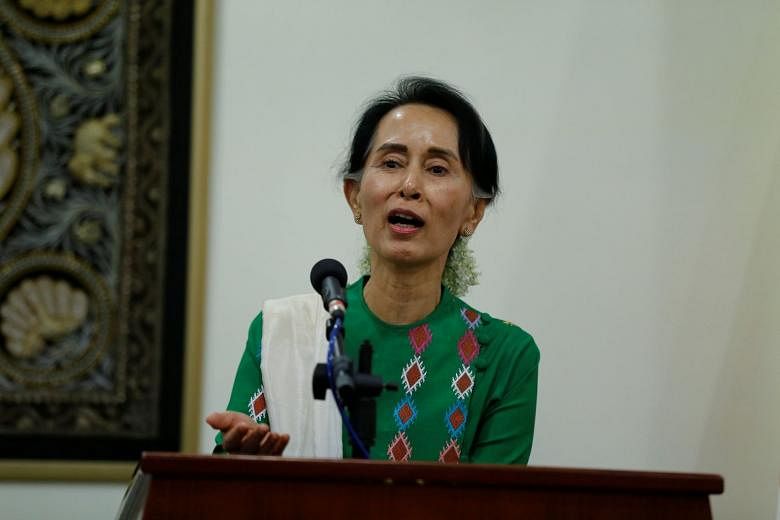BANGKOK (THE NATION/ASIA NEWS NETWORK) - Aung San Suu Kyi, who once condemned Asean's refusal to get involved in members' internal affairs, now embraces it.
Long before she was elected Myanmar's de facto leader, Aung San Suu Kyi begged members of Asean to stand strong and united against the military junta then ruling her country.
The voice of a benighted opposition, a globally admired beacon of democracy and a political prisoner who spent years under house arrest, Suu Kyi called for help every time Asean leaders met. She implored them to break with their policy of non-interference and try to halt authorised brutality and the suppression of rights in Myanmar.
Asean did nothing, prompting scorn from the Noble Peace laureate.
The policy of refusing to get involved in member-nations' domestic affairs was mere cowardice, she said. Suu Kyi was of course quite correct in chastising the group, which has in fact occasionally interfered in the internal politics of Asian countries.
While Suu Kyi was demanding Asean action in Myanmar in the late 1990s, the group was just completing a decade of intervention in Cambodia, where it pressed Vietnam to withdraw its occupying army.
Myanmar is a different case, though. Asean is feeling no threat to its collective security from the ongoing assault on the Rohingya minority, so it sticks to the policy of keeping a distance. The policy that once let Suu Kyi down so badly is now serving her well. Asean is no champion of human rights and it has a poor record on addressing the root causes of regional problems.
Appallingly, most member-nations tend to treat their minorities and especially dissidents harshly.
Asean is a cautious entity. It prefers in its group thinking to deal with members' internal issues in line with what their current rulers dictate. In its summit-closing statements it did call for Suu Kyi's release from house arrest (when there was no way of avoiding it), but it never pressed the matter further. No punitive action was ever threatened if she was not.
So Suu Kyi ends up fortunate that Asean clung to its policy once she was elected to power and began attending Asean gatherings in her own right. This week's Manila summit could have been roiled by criticism of her handling of the Rohingya crisis, which has seen the Muslim community decimated and nearly a million people forced to seek refuge in neighbouring Bangladesh. The international community, led by the United Nations, is voicing grave concern over the upheaval, but Asean refuses to lend its voice to the outcry.
The formal Asean Chairman's Statement issued as the summit closed on Monday noted the need for humanitarian relief for the Rohingya without mentioning the horrors to which they're being subjected.
This myopic response stemmed from Suu Kyi's account at the summit of the situation and her government's response, but her account was far different from what independent sources and United Nations officials are reporting. For them, the assault on the Rohingya amounts to ethnic cleansing, a crime against humanity.
UN chief Antonio Guterres was at the Manila meeting and spoke to Suu Kyi, and yet he too declined to overtly condemn what she euphemistically refers to as a "clearance operation" targeting armed Rohingya militants.
Such diplomatic leniency is enabling Suu Kyi to weather the international turbulence and to be assured that no foreign power is going to put a gun to her head.
Giving her a pass on this tragic state of events merely invites worse repercussions.
The Nation is a member of The Straits Times media partner Asia News Network, an alliance of 23 news media entities.

